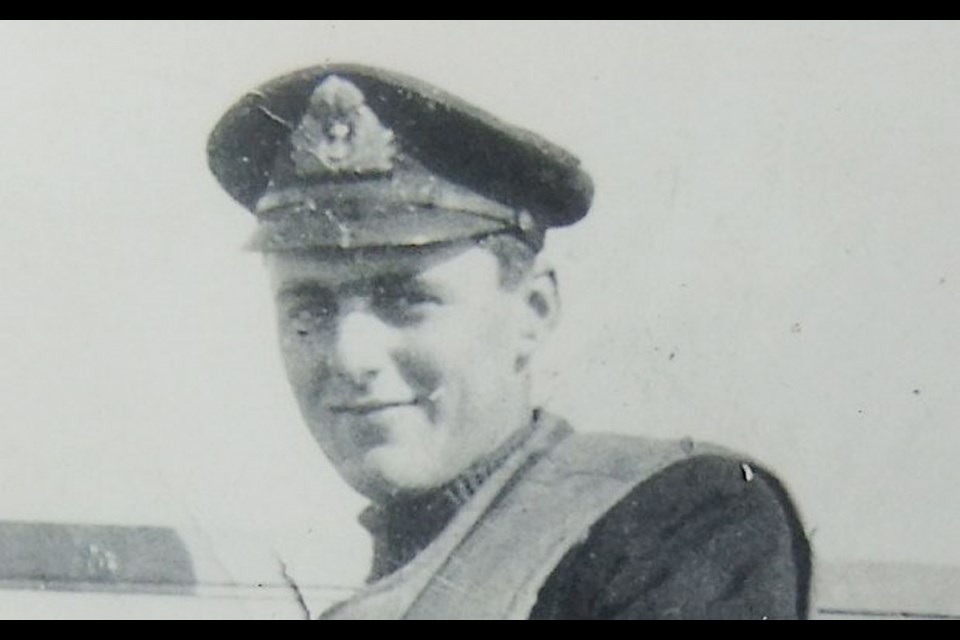 Cobble Hill’s Jenny Balme was as surprised as anyone when her brother-in-law’s secret came out.
Cobble Hill’s Jenny Balme was as surprised as anyone when her brother-in-law’s secret came out.
Others might have shouted it from the rooftops had their daring exploits been as consequential as his, but David Balme, whose capture of a German Enigma machine and its codes helped change the course of the Second World War, just kept his mouth shut until someone else finally spilled the beans.
“His family didn’t know,” Jenny said Monday. “It was hush hush for 30 years.”
When David Balme died in England on Sunday at age 95, it was big enough news to warrant a lengthy obituary in the Telegraph newspaper. The piece described how in May 1941, Balme led the boarding party that rowed out to a wallowing, abandoned German U-boat that had been blown to the surface by depth charges. Balme, a 20-year-old officer aboard the destroyer HMS Bulldog, was the first one down the conning tower.
“Balme was very frightened,” the obit read. “He expected the boat to sink, or scuttling charges to blow up at any moment, or to be overcome with chlorine from damaged batteries.”
Instead, he found the typewriter-like Enigma machine and associated information that allowed Alan Turing and his team at Bletchley Park to finally crack what the Germans thought was an unbreakable code.
Balme served as a technical adviser when his story was told in the 2000 Matthew McConaughey movie U-571 (though, of course, Hollywood turned the British sailors into Americans).
The role of Turing and the others at the super-secret British cipher centre at Bletchley, a Victorian mansion 60 kilometres north of London, was also told in two films, 2001’s Enigma and 2014’s The Imitation Game.
What’s extraordinary is that the tale didn’t leak out until 1973, with the British government finally freeing the players from the strictures of the Official Secrets Act a year later.
“That’s one of the amazing things,” says Jenny Balme. “A lot of people must have known about this, but they kept the secret. Somebody said to me: ‘That’s why they call it the secret service.’ ”
Victoria’s Olive Bailey was among those who took her oath of seriously. Now 94, she’s just finishing off a book on her time with MI6 at Bletchley, but she didn’t utter a word until the cone of silence was lifted.
“I kept my secret for a long time,” she said Monday. “You just put it away in one compartment of your brain.”
In fact, it was only about 15 years ago that she told her husband, Dr. Norman Bailey, what she did in the war — and she only did so then after a wartime colleague asked: “Have you told him yet?” in Norman’s presence.
“My mother didn’t even know that I was at Bletchley,” Olive said. Her mum only knew she was involved in some sort of war work.
It was hard to hide the details, though. Bailey remembers an air raid siren going off one day in the fall of 1940. Like the others at Bletchley, the 19-year-old waited until rooftop spotters saw the approaching German planes before seeking cover. (“We never went straight to the shelter. You’d never get any work done.”)
Except when Bailey tried to leave, a piece of jewelry she was wearing, a pin that spelled her name in gold wire, became trapped in the keys of her typewriter. She was still in the building when the bomb went off. “I was buried under the rubble for five or six hours.”
When she finally got home, caked in dust, her mother said, “There you are, dear. I thought you were dead.”
Jenny Balme, being a bit younger, had less dramatic memories. Just 11 when war broke out, her recollections were through the eyes of a child. She recalls the dogfights overhead (“You’d see all the streaks in the sky, the planes chasing each other”) and the time her father climbed onto the roof to remove an incendiary bomb (“I think he put it in a bucket of water or something.”)
That’s the thing: Those who lived through the war are disappearing. David Balme died Sunday. When Olive Bailey’s sister died a couple of weeks ago, so did her memories of tending to the wounded at the beaches of Dunkirk, where she served as a nurse.
In the last year and a half, the Times Colonist has carried the obituaries of three women who worked at Bletchley Park. All that history, all those stories, gone.
“We didn’t really think we were keeping a secret,” Bailey said Monday. “We just didn’t talk about it.”



